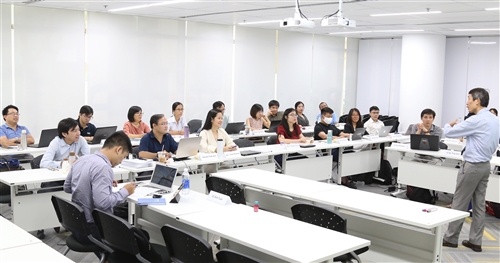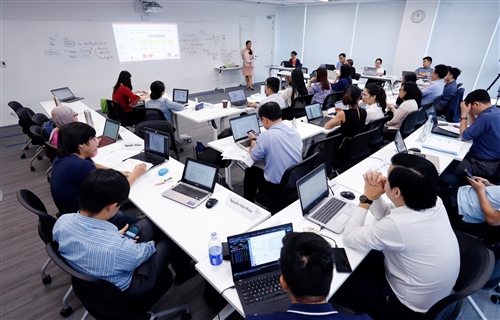Leadership and Management (LM) is one of the two concentrations in master’s in public policy at Fulbright School of Public Policy and Management. Grounded in economics, the program is particularly designed for mid and senior managers of any professions. Faculty members are leading experts in economics, law studies, and management in Vietnam. The curriculum is bench-marked against internationally acclaimed programs in the world, helping learners to absorb knowledge and skills in a short time, perfect their leadership and management capabilities, and fully prepared for the next steps of their career.
Vo Thanh Trung, Class of Leadership and Management 2020 (LM 2020), chose an issue relevant to his companies’ operations as his Capstone Project research topic. Lune Production, which he managed and chaired, is the producer behind Lang toi, A O Show, Teh Dar, Palao – spectacular performances combining traditional Vietnamese art forms. The shows have captivated thousands of international and domestic viewers. Commercially, these shows have successfully exported Vietnamese culture to the world, depicting original cultures of Northern Vietnam (Lang toi), Southern Vietnam (A O Show), the Highlands (Teh Dar), Champa cultures (Palao) through unique narratives staged in musical background. This innovative approach to preserve cultural heritage has received international acclaim in the press as “must-see cultural shows” to make sense of Vietnamese culture.

Portrait of Võ Thành Trung
During his more than 10-year career in performing arts, CEO Thanh Trung agonized over the “imbalances” governing which artistic forms would be more developed than the rest. Throughout his career, he came to realize that an understanding of how policies affect his own field is a vital issue that will determine success. In his graduation thesis, Thanh Trung researched current policies on restoration and conservation of cultural traditions and heritage, before proposing more sustainable models for cultural restoration. In view of his analysis, the State should not be the sole owner of such policies. Rather, the state should step back into a facilitator role, coordinating participation of different stakeholders from society and the private sector.
“Public policy is more relevant to performing arts than one could imagine. In view of existing imbalances in my field, I am motivated to seek better understanding of public policies. Only when you can empathize with the challenges facing public actors, can you develop and respond with win-win solutions for both sides. In the end, a good rapport with public sector is required for success in my field,” stated Thanh Trung.
The 18 months Leadership and Management program at Fulbright School has provided him with fundamental knowledge and essential skills for success. “Courses in the program are very pragmatic and of great relevance to what I am doing in my job. Analytical frameworks I learned at school help to develop my cognitive capabilities and rational mindset, guiding my research efforts in accurate directions from the start,” noted by Trung.
A tailor-made program for professionals
The LM program is tailor made for professionals who have accumulated years of experience and some achievements in their career. They can come from public sector, private firms, social organizations, research and education institutions, and more. Grounded with economics studies, the program for Leadership & Management concentration is highly customizable, with a focus on Policy Implementation and Negotiation – practice-based courses to improve decision-making capabilities for learners.
One great advantage of the Fulbright School is sound pedagogical approaches of experienced faculty who can, in a short time, explain analysis frameworks from economics to those from non-economics majors. In the leadership and management program, learners with a background in economics can better grasp complicated concepts. The shifting dynamics of Vietnamese society, the rise of the middle class, or how social networks have impacted every activity in our lives all have affected policy making and business activities. Therefore, Fulbright courses are constantly updated to stay ahead of economic, social and political changes. Some courses, though unfamiliar to Vietnamese learners, such as Behavioral Economics or Design Thinking, have also been introduced in the curriculum.
“Managers in the private sector have to maximize profits and value for owners and shareholders. These objectives represent a cornerstone of management. However, firms and organizations are susceptible to macro uncertainties and external risks such as Covid-19. Managers must understand policy responses by state regulators, as well as social responses in certain cases. Management should not be viewed solely from a technical perspective. Leadership and management courses at Fulbright do not look at a particular issue (be it private or public) from management alone, instead, we dive deep into the interaction between the government, firms and citizens,” explained economic expert and lecturer Nguyen Xuan Thanh, who leads the Leadership in Public Sector course at Fulbright.
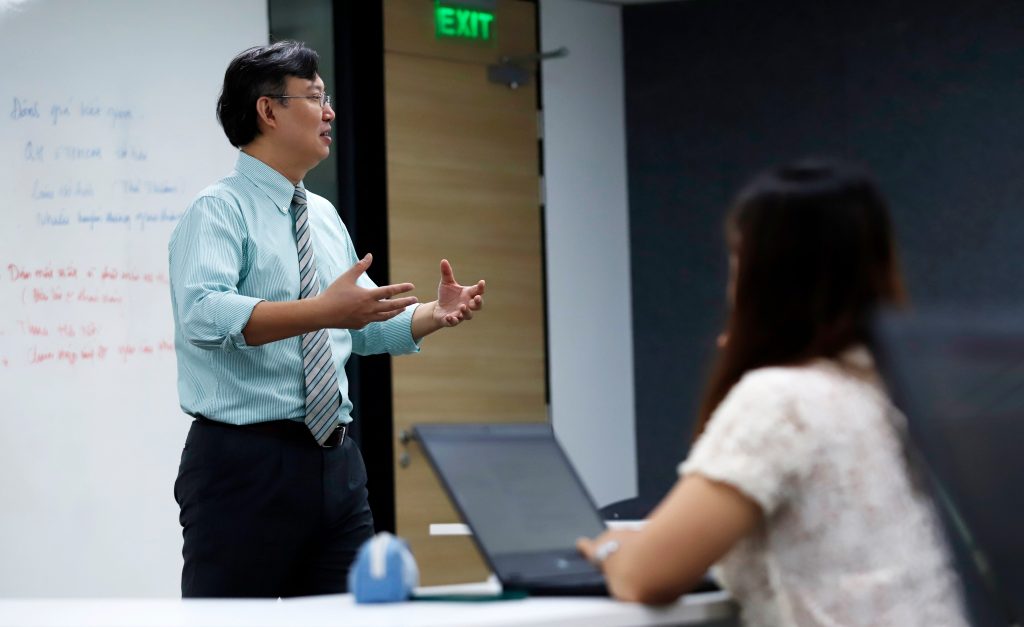
Economist and Fulbright lecturer Nguyễn Xuân Thành
Ngo Nu Huyen Trang (LM 2021), Manager at Abbott Vietnam Co., a multinational corporation here in Vietnam, appreciates that the program is systematically designed. Curriculum, teaching methods and assessment formats are structured to foster critical thinking in learners.
“The school expects learners to be both left-brained and right-brained managers by designing challenges that specifically develop quantitative and qualitative skills, allow us to empathize with the circumstances of others, and make informed decisions from empirical data as well as intuitive analysis. As a manager working for a multinational corporation, I have quickly acquired key concepts in microeconomics. But some courses such as Behavioral Economics, which are completely unfamiliar to most Vietnamese learners, can also be readily applied to my profession,” shared Huyen Trang.
Huyen Trang recalls that the LM program is designed very scientifically, constantly placing learners in new situations to which they must adapt in order to overcome these challenges. Courses are introduced into the curriculum with a clear view of how they would benefit learners. Fulbright lecturers are leading experts in Vietnamese law and economics, with profound experiences and up to date knowledge. Lecturers have overseen many senior consultancy projects for the government and development projects for provinces and regions, while remaining vocal pundits on economic and social issues. These practical experiences nourishes their teaching with practical and vivid examples.
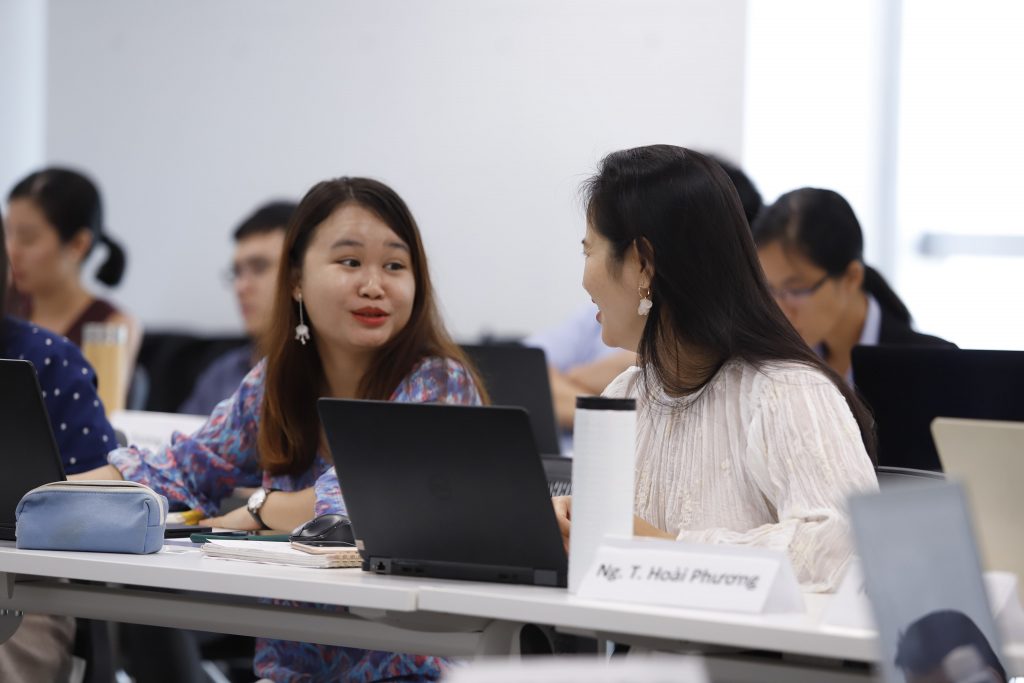

Ngô Nữ Huyền Trang in class
According to Huyen Trang, Fulbright faculty teach with an enthusiasm that kindles in students a passion for knowledge beyond what is taught in class. Passionate teachers, driven classmates and well-designed challenges foster a catalyzing environment ideal for personal growth and learning.
“In Microeconomics, I always keep in mind our teacher’s advice to not be superficial in learning, and not discuss anything before understanding it. He exemplified his principles by encouraging us to keep on learning until we understand something thoroughly. This is not a lesson in knowledge but also in life. Our Law lecturer similarly explained how a deeper understanding of cultural and historical traditions informs and builds a solid foundation for us to discover any law by ourselves. Case studies in the syllabus are contextual and updated constantly to introduce learners to the most advanced concepts,” said Huyen Trang.
Benefits of a well-designed curriculum
Lecturer Nguyen Xuan Thanh explained how Fulbright’s Leadership and Management program is designed to allow for flexible learning methods and scheduling to better suit students holding irreplaceable positions in their companies who are unable to leave their job for full-time higher education. Every two months, students learn for nine intensive days at school from Saturday to the next Sunday over. Before each intensive period, students are given the opportunity to learn parts of the curriculum online in a flipped classroom environment. Flipped classrooms constitute an innovative approach that permits students access to learning materials before class and complete some assignments through a digital platform, and interact online with lecturers and classmates.
Intensive periods at campus are very strenuous, requiring great stamina from learners. The vast amount of knowledge in the curriculum has made intensive classes very effective and time-efficient. By learning theoretical knowledge prior to class, learners can go straight to cornerstone issues, which provides more time for discussing and debating the problem with lecturers and classmates. With this arrangement, every intensive period is based on two course modules.
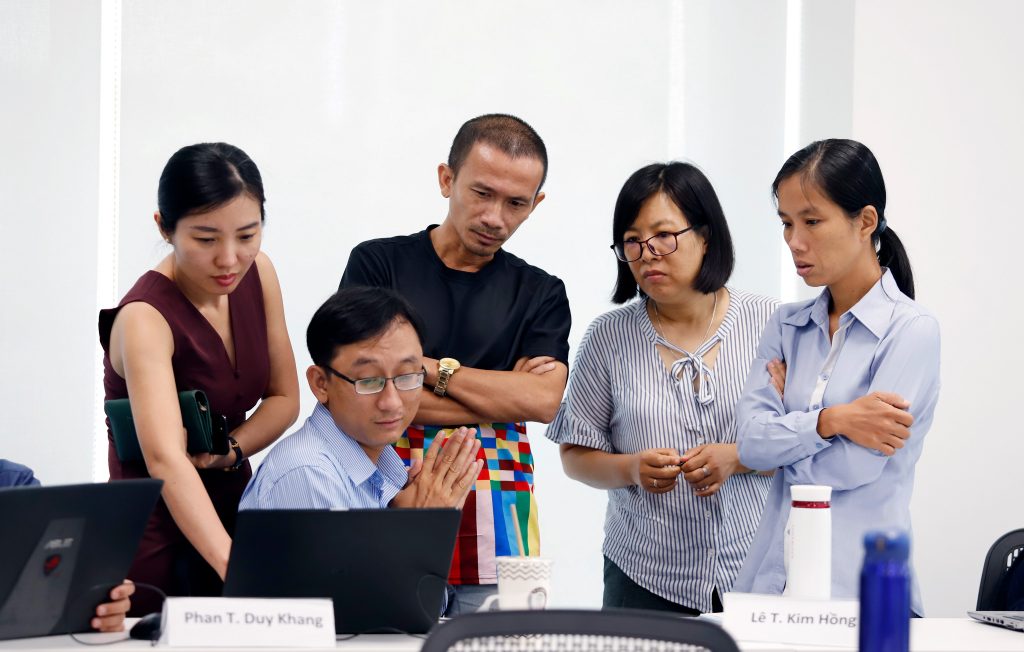
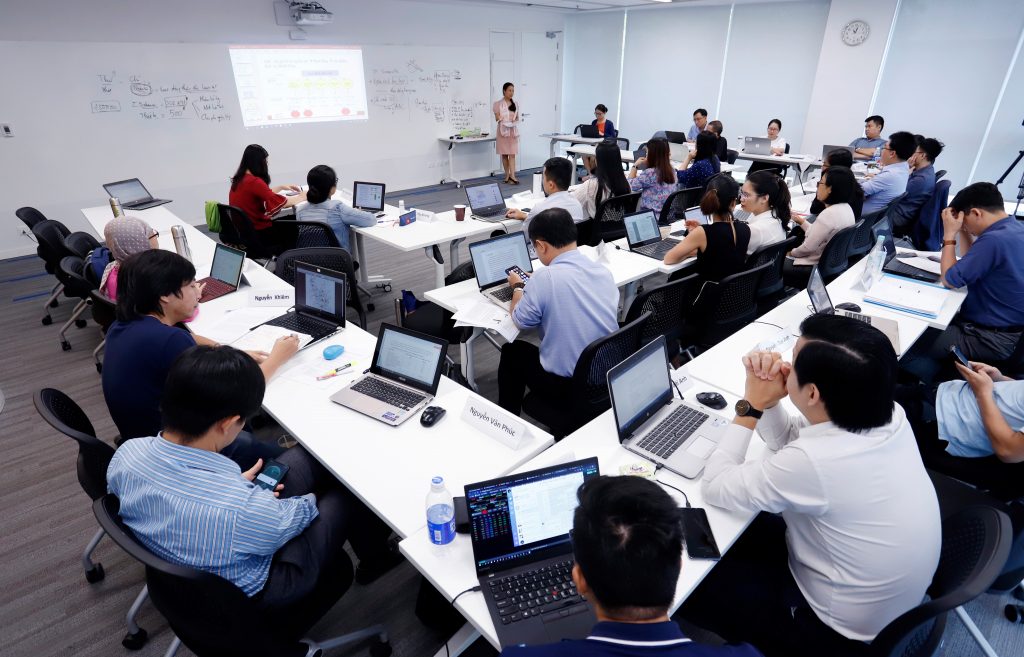
LM 2020 cohort
“I always told my classmates that flipped classroom gives us the opportunity to learn and relearn things. Lecturers are the “vitamin A” that corrects, enlightens, and accelerates our learning,” said Huyen Trang.
Another advantage of flipped classrooms in this case is the diversified class composition. For every topic and discussion, there are insider experts present participating to provide their insights, unique perspectives and personal experience. This is the “secret treasure” of Leadership and Management at Fulbright.
Since graduate students also work full-time, classes in other programs are scheduled in evenings or weekends. However, lecturer Nguyen Xuan Thanh explains Fulbright’s choice to take a different approach with its 9 intensive learning days is justified through the immense gains provided by full-time academic immersion, however short.
“Fulbright provides its learners with experiential learning because education is not about getting a higher degree. Experiencing the academic environment at school is critical to the training of our participants. Learners can take better advantage of teachers’ support, a dedicated learning environment, classmate interactions and classroom structure.
Compared to our Policy Analysis concentration, a full-time program that condenses the learning period to 9 intensive days as is the case for Leadership and Management does not compromise training quality. On the contrary, lecturers have honed methods to convey the most essential concepts in their lessons efficiently. The enormous amount of knowledge, as well as strict deadlines for assignments and group projects instill in learners the academic discipline and time management skills to completely benefit from their time at Fulbright,” emphasized lecturer Nguyen Xuan Thanh.
- Xuan Linh
Related Articles
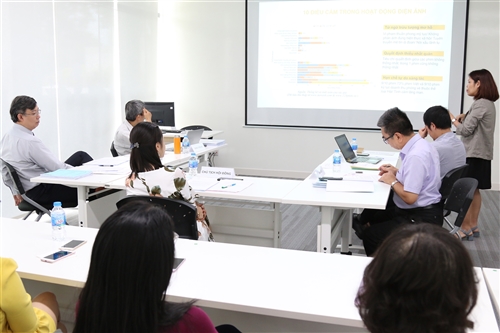
1st Class of Leadership and Management (LM 2020) defended their masters’ theses
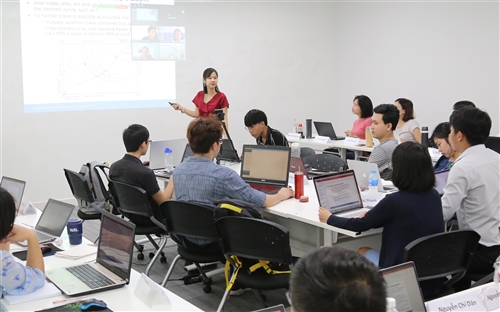
Oil Price Crashes Amidst the Covid-19 Pandemic
